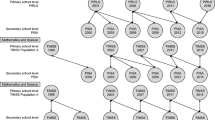Abstract
In this chapter, illustrative internationally comparative data about time at school, time spent in out-of-school programs, and homework/ individual study time are presented. In the first section this is done in a more descriptive way, while in the second and third sections, the association between the various indicators of instruction time and student performance, between and within countries, are discussed. The overall conclusion was that the results from international comparative studies concerning the association of time with educational achievement should be interpreted with a lot of caution. Negative associations of facets of time and student achievement at country level could mean that the causal direction is reversed, in the sense that more investment in time happens as a reaction to low performance rather than as a cause of higher performance. The finding that negative associations persisted in the secondary analyses of the PISA 2009 data-set, when change in time investment was related to change in performance between countries indicates that this phenomenon is not just an artifact of cross-sectional research design, but a matter of reactive policy (more time investment when achievement results are low), which compensates insufficiently for more important sources of low achievement, such as low SES composition.
Access this chapter
Tax calculation will be finalised at checkout
Purchases are for personal use only
Similar content being viewed by others
References
Baker, D. P., Fabrega, R., Galindo, C., & Mishook, J. (2004). Instructional time and national achievement: cross-national evidence. Prospects, XXXIV, 311–334.
Baker, D. P., & LeTendre, G. K. (2005). National differences, global similarities. Stanford: Stanford University Press.
Bishop, J. (1997). The effect of national standards and curriculum-based exams on achievement. The American Economic Review, 87(2), 260–264.
Fuller, B. (1987). What factors raise achievement in the Third World? Review of Educational Research, 57, 255–292.
Gustavsson, J. E.(2010, Augest). Causal inference in educational effectiveness research: A comparison of three methods to investigate effects of homework on student achievement. Invited key-note address of the second meeting of EARLI SIG 18, Centre for Evaluation and Educational Effectiveness, University of Leuven, Belgium.
Mullis, I.V.S., Martin, M.O., Gonzalez, E.J., Gregory, K.D., Garden, R.A., O’Connor, K.M., Chrostowski, S.J., & Smith, T.A.(2000).TIMSS 1999 International Mathematics Report. Findings from IEA’s Repeat of the Third International Mathematics and Science Study at the Eighth Grade. Boston College, The International Study Center.
OECD (2001). Education at a glance. OECD indicators. Paris: OECD Publishing.
OECD (2007). Education at a glance. OECD indicators. Paris: OECD Publishing.
OECD (2009). Education at a glance. OECD indicators. Paris: OECD Publishing.
OECD(2010). PISA 2009 Results What Students Know and Can Do: Student Performance in Reading, Mathematics and Science (Vol. I). Paris: OECD Publishing.
OECD (2011). Quality time for students: Learning in and out-of-school. Paris: OECD Publishing.
OECD (2012). Education at a Glance 2012: OECD Indicators. Paris: OECD Publishing.
Scheerens, J. (2004). The evaluation culture. Studies in Educational Evaluation, 30, 105–124.
Schildkamp, K. (2007). The utilisation of a self-evaluation instrument for primary education. Enschede: University of Twente.
Scheerens, J., Glas, C., & Thomas, S. (2003). Educational evaluation, assessment and monitoring. Lisse: Swets & Zeitlinger.
Scheerens, J., Glas, C.W., Jehangir, K., Luyten, H. & Steen, R. (2012). System level correlates of educational performance. Thematic report based on PISA 2009 data. Enschede: University of Twente, Department of educational organisation and management.
Woessmann, L., Luedemann, E., Schuetz, G., & West, M. R. (2009). School accountability, autonomy and choice around the world. Cheltenham: Edward Elgar.
Author information
Authors and Affiliations
Corresponding author
Editor information
Editors and Affiliations
Rights and permissions
Copyright information
© 2014 The Author(s)
About this chapter
Cite this chapter
Scheerens, J., Luyten, H., Glas, C. (2014). Time in Internationally Comparative Studies. In: Scheerens, J. (eds) Effectiveness of Time Investments in Education. SpringerBriefs in Education. Springer, Cham. https://doi.org/10.1007/978-3-319-00924-7_3
Download citation
DOI: https://doi.org/10.1007/978-3-319-00924-7_3
Published:
Publisher Name: Springer, Cham
Print ISBN: 978-3-319-00923-0
Online ISBN: 978-3-319-00924-7
eBook Packages: Humanities, Social Sciences and LawEducation (R0)




